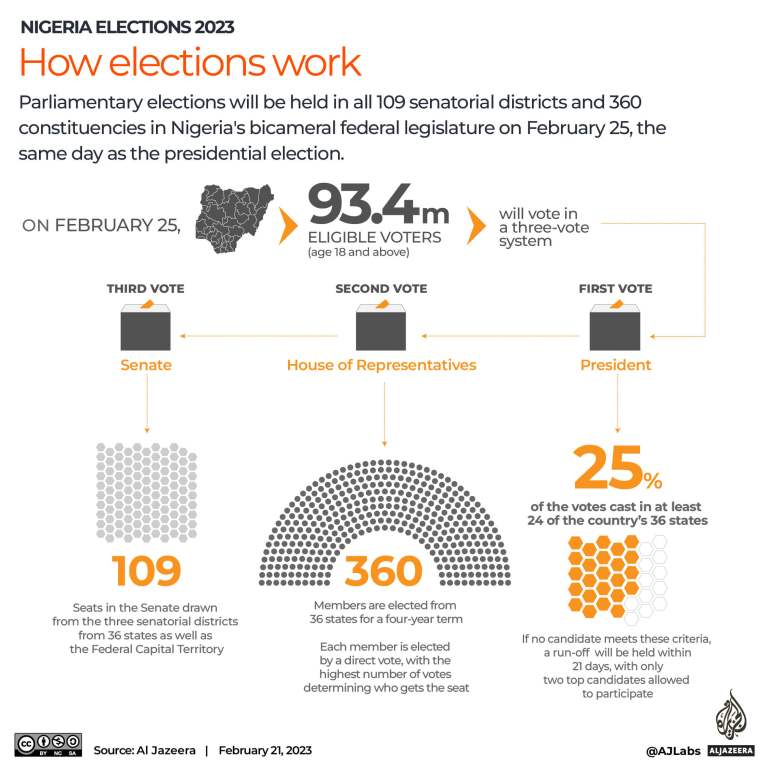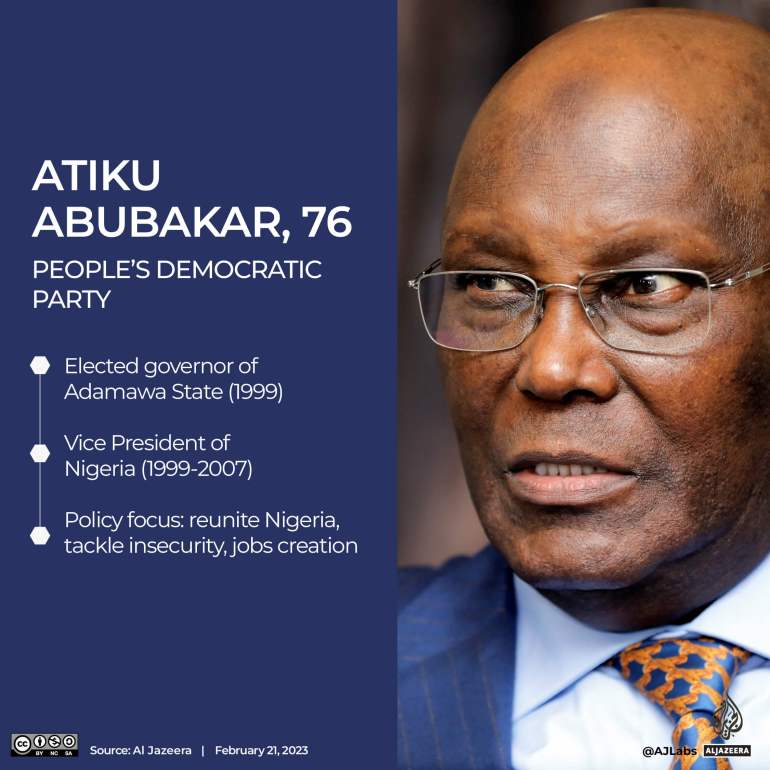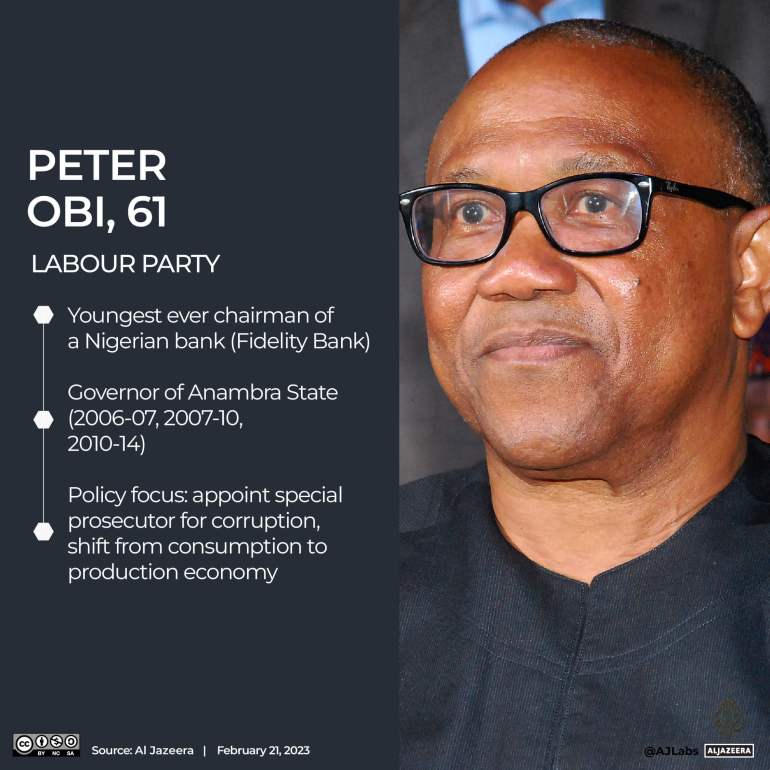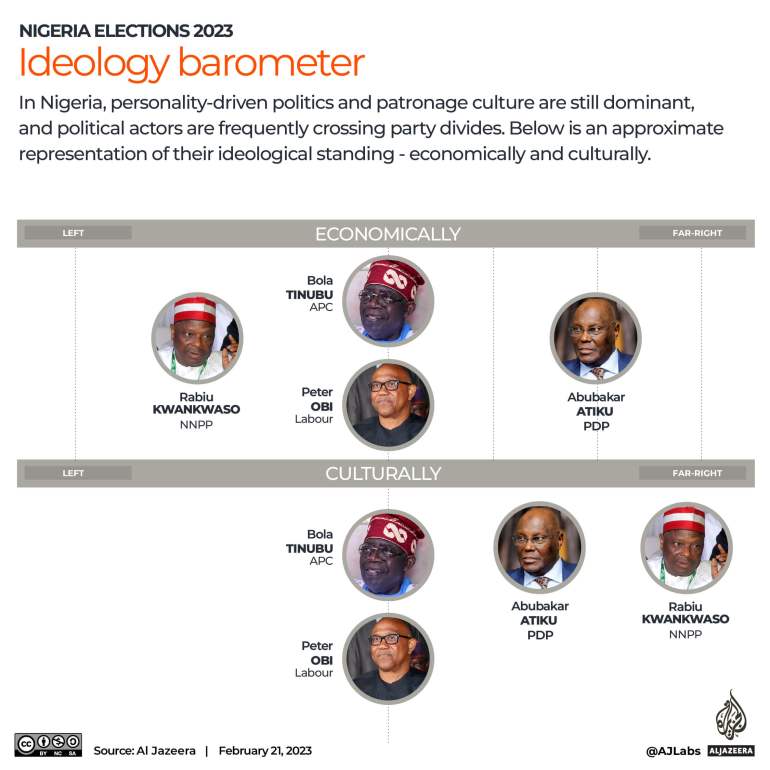Results are continuing to trickle in in Nigeria’s tightest election since the West African country returned to democracy in 1999, though a victor in the race to succeed President Muhammadu Buhari is not expected for several days.
Nearly 90 million people were eligible to vote in Africa’s largest democracy, with many Nigerians hoping a new leader will do a better job tackling insecurity, economic malaise and growing poverty.
Elections were held nationwide on February 25. Voting had to be extended into Sunday in a few parts of the country after some glitches. Counting has been under way since polls closed.
Preliminary results from Nigeria’s Independent National Electoral Commission (INEC) are provided below:
How do the elections work?
To win the presidency, a candidate must get the most votes and win at least 25 percent of votes cast in two-thirds of Nigeria’s 36 states. If no candidate meets these criteria, a run-off will be held within 21 days, with only the top two candidates allowed to participate.

When will we know the results?
The results of the elections are usually announced within three to five days after the elections.
Who are the main candidates?

Atiku Abubakar
The People’s Democratic Party (PDP) remains Nigeria’s key opposition party, and Abubakar, a veteran who is on his sixth attempt to be president, is hoping to clinch the presidency and bring PDP, which was at the helm of affairs from 1999 to 2015, back to power.
He has hinged his campaign on unifying what remains a divided country and lifting Nigeria’s economy, which has suffered two recessions in four years, out of the doldrums.
In Nigeria, which is split almost evenly between Christians and Muslims, there is a gentlemanly agreement between the main parties to share power between north and south, and Christians and Muslims. The outgoing Buhari is a northern Muslim.
Abubakar, like Buhari, is a northern Muslim – and ethnic Fulani – from the northeast. He has selected Ifeanyi Okowa, the outgoing governor of Delta State in the south and Christian, as his running mate.

Bola Tinubu
Tinubu and Atiku, former political and business associates, were among the founding fathers of the All Progressives Congress (APC) but square up on Saturday on different sides, with each hoping to pull one over the other.
The former, a two-term governor of Lagos, Nigeria’s economic capital, is credited with raising the state’s revenue, and supporters say he will replicate his success on the national stage.
He has courted controversy by doing what was considered unthinkable for more than three decades, selecting Kashim Shettima, ex-governor of Borno, as his running mate. Tinubu and Shettima are both Muslims, from the southwest and northeast, respectively.
Ahead of Saturday’s vote, they argued that competency overrules religion.

Peter Obi
The former governor of the southeastern state of Anambra, whose emergence and strong showing so far has effectively disrupted the traditional two-horse race, is also being projected as a surprise winner of the vote.
Multiple polls have predicted a win for the Labour Party and Obi, who has a large following among Nigerian youths who are disenchanted with governance in Africa’s largest economy. He was on the PDP ticket alongside Abubakar in 2019.
Obi, a wealthy capitalist famed for his frugality and overseeing an infrastructure drive during his time as governor is running with Yusuf Datti Baba-Ahmed, a former senator from the northwestern state of Kaduna.

Rabiu Kwankwaso
Seen as a wildcard in the race, New Nigerian People’s Party’s (NNPP) Kwankwaso comes with enough experience to match the other frontrunners. A former two-time governor of Kano and defence minister, he has served in the two houses of parliament.
He is immensely popular among the youth in his home region for his welfarist politics. One big achievement was a significant scholarship scheme that benefitted thousands of students from low-income households in Kano, previously known for its high numbers of the almajirai, out-of-school child beggars.
Kwankwaso is running alongside Isaac Idahosa, a bishop in the Pentecostal Christian denomination who hails from Edo State in the south.
Ideology barometer
In parts of Africa, personality-driven politics and patronage culture are still dominant, so ideology politics is not as entrenched on the continent as it was under military regimes.
Political actors are frequently crossing party divides and changing their stance on national issues depending on the stage of their career and other variables in an electoral cycle.
Below is an approximate representation of their ideological standing – economically and culturally.

